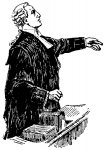Judges on trial – Shof’tim
 Since the sidra is named Shof’tim, “Judges”, let us ask what task a judge is meant to carry out.
Since the sidra is named Shof’tim, “Judges”, let us ask what task a judge is meant to carry out.
The popular view in the English jury system is that the jury decides the facts (“Did he or didn’t he do it?”) and the judge decides the law (“What penalty does the law prescribe in this situation?”). The advocates bring to the judge’s attention the principles of law which they submit have relevance to the case.
In Jewish law the legal profession is basically irrelevant; the judge would not be a judge if he did not know the law and he does not need counsel to educate him. The role of the lawyer if there is one is to help the parties to put their cases into words, since it would harm their case if they could not articulate it. The judge hears the evidence and determines the facts, and then applies the law.
Being a judge is never easy. The Alexandrian philosopher Philo said, “A judge must bear in mind that when he tries a case he himself is on trial”. The sages said, “He who renders true judgment is God’s partner” (Mechilta to Ex. 18:13).



